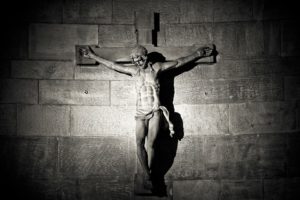Christianity claims the Holy Bible is the authority of Jesus Christ. (1) Therefore, there need be no argument that the bible has as its central theme the life and purpose of Jesus Christ. Within the bible then, he is reported to be the Son of God and he is reported to even have made the claim to be God himself. Christianity is, in fact, built upon this dogma.
Jesus, as God, came to earth to reveal God’s message: his second will or the New Testament. He was, in essence, the human messenger of God, and God himself. To remove one aspect is to remove both, for Jesus himself claims both: he claims to be the Son of God,(2) and then claims to be God.(3) It is reasonable to believe that God and/or the Son of God would not lie about such things, nor would God inspire the men who wrote the gospel books to lie about Jesus, assuming that the Holy Bible contains the truth.
Jesus Died to Save Mankind
But how is it then that God would murder his own Son to save mankind? Or, should Jesus be God, how could God, as Jesus, commit suicide? Should there not have been a better way? “As if mankind could be improved by the example of murder; and to tell him that all this is a mystery is only making an excuse for the incredibility of it.”(4)
Further, if dying was the purpose for the man-god incarnation of Jesus, the suffering he endured (bad as it was reported to have been), would’ve been tempered by knowing it was a ticket back home to heaven. What suffering wouldn’t we endure, if we knew that in just a little while we would be transported to something as wonderful as heaven is purported to be? The potency of suffering is diluted when the ultimate outcome is known to be something even better than what we were experiencing before the suffering began. Think about it! Jesus, the man-god, was taking on the sin of the world. Wouldn’t that would be unbearable? Did all the sin of the world really only merit a few short hours to repudiate? Is it reasonable that we must carry the consequences of our sin for a lifetime, even though Jesus supposedly abolished all of it in such a short time? (5)
So did Jesus really die for our sins?
Was the crucifixion itself real? Gospel writers Mark and John, alleged witnesses of the crucifixion, couldn’t agree about the time of day it took place. Mark wrote that the crucifixion was about 9 a.m.(6) John wrote that Jesus was sentenced about noon,(7) meaning the crucifixion would have taken place in the afternoon. How could these writers, divinely inspired by God himself, and alleged eyewitnesses of the event, confuse the hour of such a historically consequential event?
 Further, Jesus reportedly remarked before he died, “For just as Jonah was three days and three nights in the belly of the great fish, so will the Son of Man be three days and three nights in the heart of the earth.”(8) But Jesus was sentenced and crucified on a Friday and was buried before 6 p.m. that evening. The bible reports he arose early Sunday morning, which means he was in “the heart of the earth” for only two nights and one day. Once again, would God have allowed such discrepancies – innocent as they may be – through writers who were divinely inspired?
Further, Jesus reportedly remarked before he died, “For just as Jonah was three days and three nights in the belly of the great fish, so will the Son of Man be three days and three nights in the heart of the earth.”(8) But Jesus was sentenced and crucified on a Friday and was buried before 6 p.m. that evening. The bible reports he arose early Sunday morning, which means he was in “the heart of the earth” for only two nights and one day. Once again, would God have allowed such discrepancies – innocent as they may be – through writers who were divinely inspired?
Jesus rose from the dead
When Jesus rose from the dead, as he claimed he would, he appeared only to the disciples and a few others. (Paul records he appeared before a crowd of 500, but there is no other mention of it in the gospel records). Why the secrecy? Remember, according to the bible, this is GOD we’re talking about. Why would Jesus, having been raised from the dead (!), hide from so many people? Wouldn’t his appearance to all have made a bigger impact, especially to the Romans who subjected him to the crucifixion and assured his death and burial?
 The deity of Jesus is in doubt when such dissonance exists, not necessarily because the inconsistencies can’t be reconciled, but because the bible is regarded as the inspired word of God, and as such, it is unconscionable to think God allowed corruption or confusion to occur. Because Jesus claimed to be both the Son of God and God himself, it seems that his human message is in jeopardy. What portion of his message remains true knowing, at least in part, there are minor disparities and larger discrepancies that are impossible to harmonize?
The deity of Jesus is in doubt when such dissonance exists, not necessarily because the inconsistencies can’t be reconciled, but because the bible is regarded as the inspired word of God, and as such, it is unconscionable to think God allowed corruption or confusion to occur. Because Jesus claimed to be both the Son of God and God himself, it seems that his human message is in jeopardy. What portion of his message remains true knowing, at least in part, there are minor disparities and larger discrepancies that are impossible to harmonize?
Scripture references:
(ESV): The Holy Bible: English Standard Version., (Wheaton: Standard Bible Society, 2001)
(1) Thirty-nine Articles, Art. VI; Westminster Catechism, Q. 3; James White, Does The Bible Teach Sola Scriptura?
(2) John 5:25-26
(3) John 10:30
(4) Thomas Paine (1995). Thomas Paine, Collected Writings: Common Sense, The Crisis, and Other Pamphlets, Articles, and Letters; Rights of Man; The Age of Reason. New York. Library Classics of the United States. 703
(5) Christians may argue here that their sins are forgiven, but I am referring to the consequences of sin which are not necessarily relieved: physical and mental health, financial stress, social disorder, natural disasters, and death still happen to Christians and non-Christians alike. The consequences of sin affecting eternal life are not discussed in this article.
(6) Mark 15:25
(7) John 19:14-15
(8) Matthew 12:40






